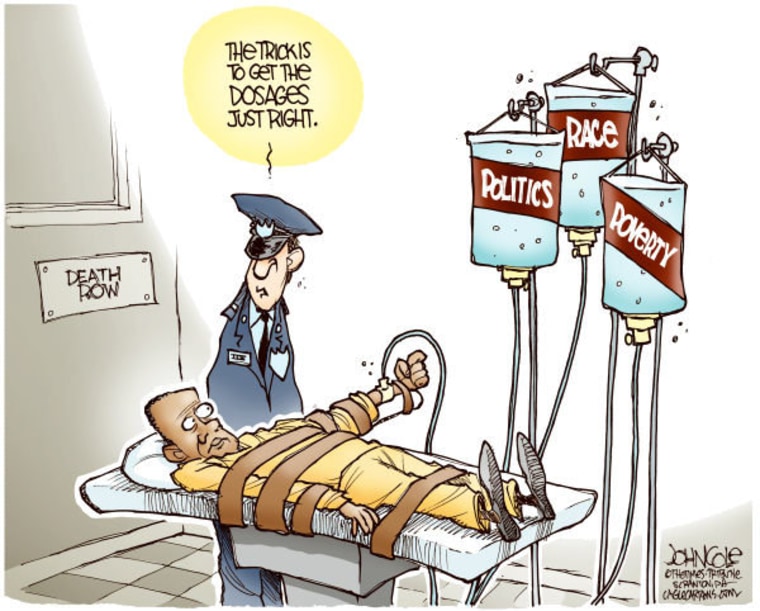Thirteen months ago, Milton Mathis was killed by the state of Texas, in part, because of a childhood I.Q. test.
His attorneys argued that since Mathis had scored a 62 on a test administered by the state correctional system in 2000 -- putting him eight points below the standards for mental retardation -- but since prosecutors pointed to his history of violence and gave greater weight to a score higher than 70 from a much earlier test, the 32-year-old Mathis was eventually executed for killing two people and crippling a third in a drug-house shooting. Mathis went to his death screaming, "The system has failed me."
The Huffington Post's John Rudolf noted in his report that Mathis had been sentenced to death in 1999, three years before the U.S. Supreme Court ruled that execution of the mentally retarded violated the Constitution's prohibition on cruel and unusual punishment. You'd think that would make current Texas death-row inmate Marcus Druery a lucky man in this regard. Druery was convicted of the brutal 2002 murder of a tech-college classmate, Skyylar Browne, but his execution has been stayed by the Texas Court of Criminal Appeals for now because, well, Druery is what some less-than-sensitive people might call "nuts."
Salon's Rania Khalek writes this morning that during Druery's incarceration on death row, he'd been diagnosed repeatedly with schizophrenia, and had exhibited paranoia, delusions, and auditory hallucinations. All that added up to a guy who didn't comprehend what he'd done, or why he was about to die for it.
And make no mistake: it's not like Texas hasn't been trying to kill Druery, and still may do so. A lower court last week denied his attorneys' request for a competency hearing, despite the diagnosis above. Khalek interviewed one of Druery's attorneys, who was aghast at how willing the lower-court judge was to ignore evidence of the prisoner's incompetence, evidence that included this bizarre note:
In a letter to the Brazos court in early June, titled “May I have a stay because…,” Druery provides 21 reasons for why his execution should be halted, which included the following: “The witnesses need to be questioned properly. Such as Kim Kardashian who may be able to get Johnny Cochrans records about my life. (He was my atty. once before)”; “I’m one of the last surviving males of God’s lineage”; and, “I slept w/ DA Jarvis Parsons wife and he once used my money to go gamble in Las Vegas and couldn’t pay it back.”
A Houston Chronicle editorial admonished the court for denying the competency hearing.Legal analyst Andrew Cohen adds more details about the judge's aberrant behavior in The Atlantic, and wondered aloud whether the Supreme Court would let that pass. Cohen also makes note of the same legal precedent cited by Druery's attorneys -- Ford v. Wainwright and Panetti v. Quarterman -- to ask some other very compelling questions:
In both Ford and Panetti, prison doctors found their inmates to be competent. There is, as of yet anyway, no such similar finding in the Druery case (much less the due process hearing required under both of those precedents). So can Texas constitutionally ignore the diagnoses of its own prison doctors and refuse to provide Druery with the hearing required under Ford? Can the words and deeds of a diagnosed schizophrenic be used against him for purposes of an execution?
Governor Rick Perry's horrific record of death-row executions is well-noted, the state has every other one in the union lapped when it comes to body count, and the ghost of Cameron Todd Willingham still haunts them. We also saw last year that it had to take a Supreme Court ruling to stop the execution of a Texas man who'd been racially insulted from the bench. But what about the mentally ill?
Or even just the overheated? In a Texas summer, it seems that even the prisons themselves can kill:
Ten inmates of the state prison system died of heat-related causes last summer in a 26-day period in July and August, a death toll that has alarmed prisoners’ rights advocates who believe that the lack of air-conditioning in most state prisons puts inmates’ lives at risk.The 10 inmates were housed in areas that lacked air-conditioning, and several had collapsed or lost consciousness while they were in their cells. All of them were found to have died of hyperthermia, a condition that occurs when body temperature rises above 105 degrees, according to autopsy reports and the state’s prison agency.
The most recent death occurred last week. We'll see what, if anything, prisoners' rights advocates can push Texas to do the right thing, and install air conditioners. But considering the history of Texas killing people whom it's judged, even if they're innocent or mentally ill, I won't be surprised when they're unsuccessful. Texas is displaying a strange combination of wanton urgency and utter carelessness when it comes to its prisoners.
The reasons why the death penalty is a moral and legal abomination have largely to do with the lethal cocktail of politics and social ills you see in the cartoon above. Seeing what's happening in Texas today, I have to add another bag with "Disregard for the Mentally Ill" written on it. That is, if they haven't boiled to death in their cells first.
